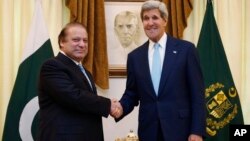ISLAMABAD —
The United States and Pakistan are pledging to resume a high-level strategic dialogue on security issues. The pledge came as U.S. Secretary of State John Kerry met with senior Pakistani officials in Islamabad to discuss a range of security, regional and bilateral issues.
Kerry said his visit this week aims to resume high level negotiations on key issues and work with Pakistan’s new leadership on counter terrorism, regional stability, and trade and investment.
He also invited Pakistani Prime Minister Nawaz Sharif to the United States for talks with President Barack Obama.
“In the last few years, we've experienced a few differences," Kerry noted. "I think we came here today, both the Prime Minister and myself, with the commitment that we cannot allow events that might divide us in a small way to distract from the common values and the common interests that unite us in big ways. As we discussed this morning, the common interests far exceed and far outweigh any differences.”
Kerry said meetings this week with Pakistan’s newly-elected civilian leadership were marked by a determination from both countries to resolve issues that have been irritants over the past years.
In recent years, relations have deteriorated over U.S. drone strikes in Pakistan’s tribal northwest, the mistaken killing of Pakistani soldiers along the Afghan border in 2011, and the U.S. raid into Pakistan that killed Osama bin Laden.
Washington has been frustrated by Pakistan’s apparent inability or unwillingness to eradicate terrorist safe havens, some of which are allegedly used to launch cross-border attacks on U.S. troops in Afghanistan.
With the U.S. troop drawdown in neighboring Afghanistan expected in 2014, Kerry said addressing the threat of cross-border militancy is key. Washington has often pointed to Islamabad's ambiguous stance on terrorist Islamist groups on its soil.
"The choice for Pakistanis is clear: will the forces of violent extremism be allowed to grow more dominant, eventually overpowering the moderate majority? And I ask anybody in Pakistan to ask themselves, how many bridges have those terrorists offered to build? How many schools have they opened? How many economic programs have they laid out for the people? How many energy plants have they tried to build? I think the choice is clear," Kerry said.
Sartaj Aziz, the prime minister’s adviser on foreign affairs, said Pakistan's new government had discussed with Kerry its plans on how to tackle internal terrorism,
"On the safe havens, of course we had a very detailed discussion, with our plans, on our overall counterterrorism strategy," Aziz explained, " the All Parties Conference that we are planning to hold, and how the follow up will take place and as it unfolds you will all come to know how we propose to deal with it."
Aziz made clear his government’s rejection of U.S. drone strikes, which many Pakistanis believe are a violation of national sovereignty. But Aziz welcomed the resumption of the strategic dialogue with the U.S.
"Let me state it clearly that we are committed to work together in all these areas in a very pragmatic and positive manner on the basis of respect for each other's interests and concerns," Aziz said.
Pakistani officials also reiterated its pledge to act as a facilitator in talks between Afghanistan and the Taliban, aimed at bringing a peaceful resolution to the conflict in that country. Afghan President Hamid Karzai is expected to visit Islamabad later this year.
Kerry has visited Pakistan before as a U.S. senator. This was his first visit as Secretary of State.
Kerry said his visit this week aims to resume high level negotiations on key issues and work with Pakistan’s new leadership on counter terrorism, regional stability, and trade and investment.
He also invited Pakistani Prime Minister Nawaz Sharif to the United States for talks with President Barack Obama.
“In the last few years, we've experienced a few differences," Kerry noted. "I think we came here today, both the Prime Minister and myself, with the commitment that we cannot allow events that might divide us in a small way to distract from the common values and the common interests that unite us in big ways. As we discussed this morning, the common interests far exceed and far outweigh any differences.”
Kerry said meetings this week with Pakistan’s newly-elected civilian leadership were marked by a determination from both countries to resolve issues that have been irritants over the past years.
In recent years, relations have deteriorated over U.S. drone strikes in Pakistan’s tribal northwest, the mistaken killing of Pakistani soldiers along the Afghan border in 2011, and the U.S. raid into Pakistan that killed Osama bin Laden.
Washington has been frustrated by Pakistan’s apparent inability or unwillingness to eradicate terrorist safe havens, some of which are allegedly used to launch cross-border attacks on U.S. troops in Afghanistan.
With the U.S. troop drawdown in neighboring Afghanistan expected in 2014, Kerry said addressing the threat of cross-border militancy is key. Washington has often pointed to Islamabad's ambiguous stance on terrorist Islamist groups on its soil.
"The choice for Pakistanis is clear: will the forces of violent extremism be allowed to grow more dominant, eventually overpowering the moderate majority? And I ask anybody in Pakistan to ask themselves, how many bridges have those terrorists offered to build? How many schools have they opened? How many economic programs have they laid out for the people? How many energy plants have they tried to build? I think the choice is clear," Kerry said.
Sartaj Aziz, the prime minister’s adviser on foreign affairs, said Pakistan's new government had discussed with Kerry its plans on how to tackle internal terrorism,
"On the safe havens, of course we had a very detailed discussion, with our plans, on our overall counterterrorism strategy," Aziz explained, " the All Parties Conference that we are planning to hold, and how the follow up will take place and as it unfolds you will all come to know how we propose to deal with it."
Aziz made clear his government’s rejection of U.S. drone strikes, which many Pakistanis believe are a violation of national sovereignty. But Aziz welcomed the resumption of the strategic dialogue with the U.S.
"Let me state it clearly that we are committed to work together in all these areas in a very pragmatic and positive manner on the basis of respect for each other's interests and concerns," Aziz said.
Pakistani officials also reiterated its pledge to act as a facilitator in talks between Afghanistan and the Taliban, aimed at bringing a peaceful resolution to the conflict in that country. Afghan President Hamid Karzai is expected to visit Islamabad later this year.
Kerry has visited Pakistan before as a U.S. senator. This was his first visit as Secretary of State.






